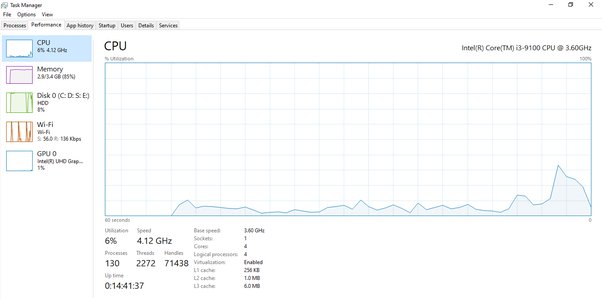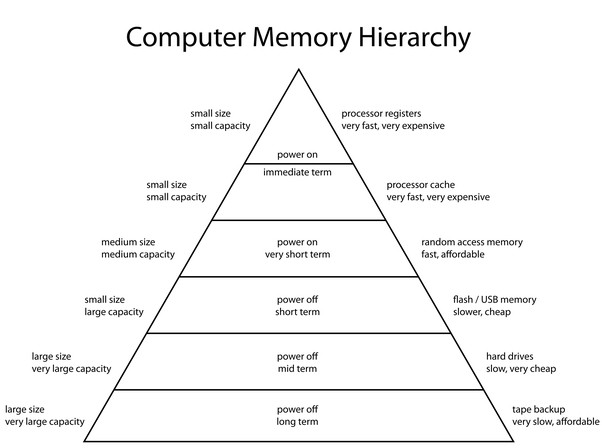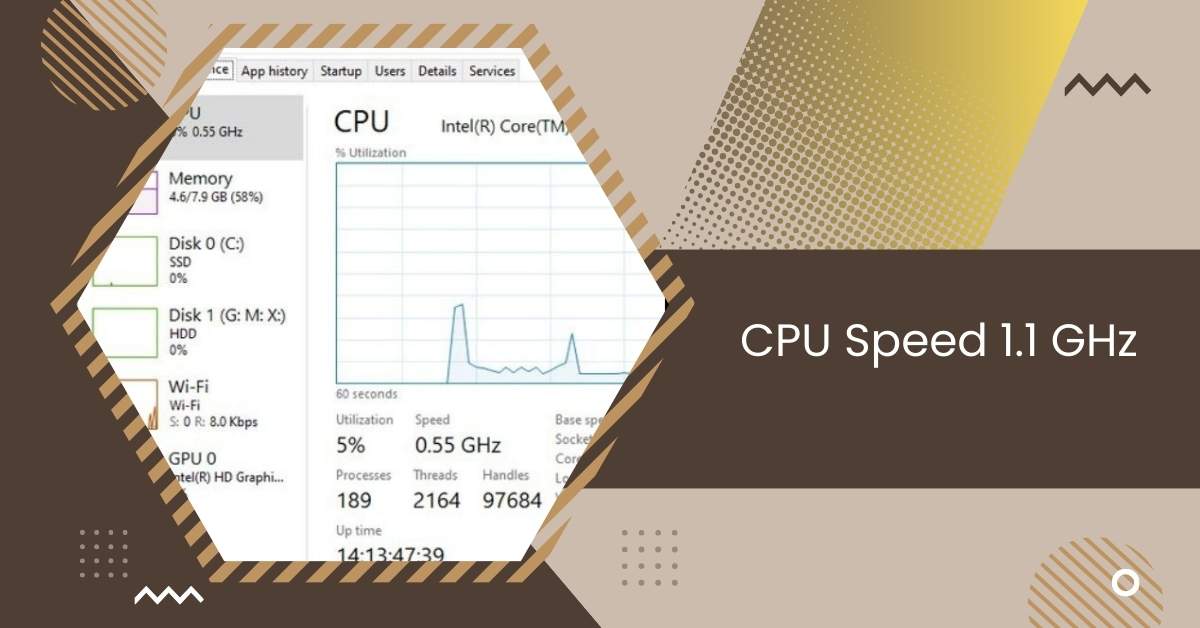In computing, the central processing unit (CPU) plays a pivotal role in determining the overall performance of a device.
A CPU speed of 1.1 GHz indicates the processor’s base operating frequency, offering improved performance for everyday tasks. Despite its seemingly modest clock speed, 1.1 GHz performs satisfactorily for regular computing needs.
This article delves into CPU speed, focusing mainly on the 1.1 GHz range, advantages, and limitations.
Understanding GHz
When we talk about GHz, we’re talking about how fast a computer brain works. It’s like the heartbeat of your computer.
The higher the GHz, the faster your computer can do things. So, when you see “1.1 GHz CPU,” it means the computer’s brain runs at 1.1 billion heartbeats per second.
That’s pretty fast! Imagine your computer’s brain running fast every second, handling tasks like browsing the web, writing documents, or watching videos.
So, GHz helps us understand how speedy a computer’s brain is, making it easier to choose the right computer for our needs.
CPU Speed: 1.1 GHz Explained

Let’s break down what a 1.1 GHz CPU means in simple terms. Picture your computer’s brain as a busy worker.
GHz tells us how fast this worker can complete tasks. When we say “1.1 GHz CPU,” it’s like saying this worker can complete 1.1 billion tasks every second! That’s pretty impressive.
While 1.1 GHz may not sound as fast as some other CPUs, it’s still quite snappy for everyday jobs like browsing the web, writing emails, and watching videos.
A 1.1 GHz CPU might be just what you need for your day-to-day computer tasks without breaking the bank.
Advantages of 1.1 GHz CPUs
1. Energy Efficiency: 1.1 GHz CPUs are known for efficiently managing power consumption. They don’t drain your device’s battery quickly, allowing for longer usage times without recharging.
2. Affordability: Compared to higher GHz processors, 1.1 GHz CPUs are often more budget-friendly. This makes them accessible to a wider range of consumers who want reliable performance without breaking the bank.
3. Everyday Tasks: For everyday computing needs like web browsing, word processing, and streaming media, a 1.1 GHz CPU is more than capable. It handles these tasks smoothly without any noticeable slowdown.
4. Quiet Operation: Since 1.1 GHz CPUs consume less power and generate less heat, devices equipped with these processors tend to operate quietly. You won’t hear noisy fans kicking in to cool down your device during routine tasks.
5. Portability: Many devices featuring 1.1 GHz CPUs are lightweight and compact, making them highly portable. Whether traveling or working on the go, these devices are easy to carry around without weighing you down.
6. Longevity: Due to their efficient design and optimized performance, devices with 1.1 GHz CPUs often have longer lifespans. They can remain relevant and useful for longer, providing value for your investment over time.
Read: CPU Usage Drops When I Open Task Manager – Ultimate Guide!
Limitations of 1.1 GHz CPUs

- Performance in Demanding Tasks: While suitable for everyday computing, 1.1 GHz CPUs may struggle with resource-intensive tasks like video editing, gaming, or running complex software. Their lower clock speed can result in slower processing times and decreased responsiveness in such applications.
- Multitasking Challenges: Heavy multitasking can pose challenges for 1.1 GHz CPUs. Running multiple programs simultaneously may lead to performance bottlenecks and slower overall system performance, especially when handling demanding tasks concurrently.
- Gaming Limitations: Gaming enthusiasts may need more than 1.1 GHz CPUs to run modern, graphics-intensive games smoothly. These processors may need help to deliver the required performance for an optimal gaming experience, particularly in titles with high graphical fidelity and processing demands.
- Future-Proofing Concerns: As technology advances and software becomes more demanding, 1.1 GHz CPUs may need help with evolving requirements. Devices equipped with these processors may become less capable of running future software updates and applications efficiently.
- Professional Applications: Professionals requiring computational power for tasks such as 3D rendering, video encoding, or scientific simulations may find 1.1 GHz CPUs needing more performance. These processors may offer lower speed and efficiency required for such demanding professional applications.
- Upgradability Constraints: In many cases, the end user cannot upgrade the CPU speed of a device with a 1.1 GHz processor. This lack of upgradability limits the ability to improve performance over time, as users may need to replace the entire device to access faster CPU speeds.
Tips for Optimizing Performance on 1.1 GHz CPUs
- Limit Background Programs: Close unnecessary programs running in the background to reduce CPU load.
- Use Lightweight Software: Opt for lightweight applications that demand fewer resources for smoother performance.
- Regular System Maintenance: Keep your system clean and updated to ensure optimal performance.
- Manage Startup Programs: Disable unnecessary startup programs to minimize CPU usage at boot time.
- Utilize Hardware Upgrades: Consider upgrading RAM or installing an SSD for improved overall performance.
- Optimize Power Settings: Adjust power settings to prioritize performance over energy savings when needed.
- Monitor Temperature: Monitor CPU temperature to prevent overheating and maintain consistent performance.
- Update Drivers: Ensure all device drivers are up-to-date to maximize compatibility and performance with your 1.1 GHz CPU.
- Optimize Browser Settings: Configure your web browser for efficiency by turning off unnecessary plugins and extensions that can strain CPU resources.
- Reduce Visual Effects: Minimize graphical effects and animations in your operating system settings to lessen the burden on your 1.1 GHz CPU.
What Is a PC Processor And What Does it Do?

A PC processor is like the brain of your computer. It’s a tiny chip inside your computer that helps it do all sorts of things, like running programs, processing data, and handling tasks.
Think of it as the mastermind behind everything your computer does, from opening apps to playing games.
In simple terms, the processor is what makes your computer work!
Read: How To Reset Overclock CPU – Improve CPU Speed In 2024!
Processor Cores Versus Clock Speed
Processor cores and clock speed are important factors affecting a computer’s performance. Cores act like individual workers, handling different tasks simultaneously, while clock speed measures how fast these workers operate.
More cores mean better multitasking, while higher clock speeds mean faster task completion.
1. What is a processor core?
A processor core is like a mini-computer brain inside your main computer brain. It’s a small but powerful part of being responsible for doing tasks.
The more cores you have, the more tasks your computer can handle, making it faster and more efficient.
2. What is clock speed?
Clock speed refers to how fast a computer’s processor can complete tasks. It’s measured in gigahertz (GHz), indicating the number of cycles the processor can execute per second.
A higher clock speed means the processor can process instructions more quickly, resulting in faster overall performance for your computer.
3. How do I choose between more processor cores or a higher clock speed?
Choosing between more processor cores or a higher clock speed depends on your needs. If you do lots of tasks at once, more cores are helpful.
But a higher clock speed is better if you need things done quickly. It’s about finding the right balance for your usage.
4. What is a good processor speed for a laptop versus desktop?
When considering processor speed for a laptop versus a desktop, it’s essential to match it with your usage.
Generally, a laptop with a lower processor speed, around 2-3 GHz, is suitable for everyday tasks.
In contrast, desktops may benefit from higher speeds, like 3-4 GHz, for more demanding applications.
1.1 GHz quad-core too slow?
Not necessarily. While it may struggle with demanding tasks, it’s suitable for essential use like browsing and word processing. Consider your needs before deciding.
Is a 1.1 gHz Core M powerful enough for me?
Depends. It’s okay for simple stuff like emails and browsing. But you might need something more substantial for heavier tasks like gaming or editing.
Intel Celeron 1.1 GHz vs 2.4 GHz
The 2.4 GHz is faster than the 1.1 GHz. If you’re doing basic tasks like browsing or word processing, the 1.1 GHz is fine. But for gaming or multitasking, go for the 2.4 GHz.
Is Quad Core 1.1GHz, up to 2.4GHz CPU ok?
It depends on your needs. For basic tasks, the 1.1 GHz is sufficient. But if you need more power for gaming or multitasking, the boost to 2.4 GHz helps.
Is 1.1 GHz actually half as slow as 2.4 GHz? Explain it to me like I’m a child.
Let’s see. Imagine GHz, which is how fast a car goes. If one car goes 1.1 miles per hour and another goes 2.4 miles per hour, the second car is faster. But it’s just as fast. It’s just quicker. So, while 2.4 GHz is more rapid than 1.1 GHz, it’s not exactly twice as fast.
The 2.5 ghz board is only reporting 1.1 ghz
This could be due to several reasons, like software limitations or hardware issues. Troubleshooting may be needed to determine the cause and resolve the discrepancy.
Is 1.1ghz good for gaming
Not really. Gaming typically requires higher processing power for smooth performance. A 1.1 GHz CPU may struggle with demanding games and might not provide the best gaming experience.
Cpu speed 1.1 ghz Windows 10
Windows 10 can run on a CPU with a 1.1 GHz speed, but it may perform poorly, especially for multitasking or running resource-intensive applications.
Is 1.1ghz processor speed good for school
Yes, for basic school tasks like writing papers, browsing the internet, and using educational software, a 1.1 GHz processor is sufficient.
Is 1.1 ghz good for programming
It depends on the complexity of the programming tasks. For basic coding and scripting, a 1.1 GHz processor may suffice. However, for more intensive development work, a faster processor is recommended.
Cpu speed 1.1 ghz laptop
A laptop with a 1.1 GHz CPU speed can handle basic tasks like web browsing, word processing, and multimedia playback. However, it may need help with more demanding applications and functions that require higher processing power.
1.10 ghz processor generation
Processors with a speed of 1.10 GHz can belong to various generations, ranging from older models to more recent ones. The generation of the processor depends on its specific model and release date.
Is 1.1 ghz good for Chromebook
Yes, a 1.1 GHz processor is typically sufficient for basic tasks like web browsing, using web-based applications, and light productivity work on a Chromebook. However, it may need help with more demanding tasks or multitasking.
Is A 1.1 GHz processor fast enough?
It depends on what you’re using it for. For basic tasks like web browsing and word processing, it’s adequate. However, more demanding tasks like gaming or video editing could be more active.
What does 1.1 GHz processor mean?
A 1.1 GHz processor means the central processing unit can perform 1.1 billion clock cycles per second. This determines how quickly tasks are executed on your device.
Is 1.0 GHz processor speed good?
It depends on what you plan to do with your device. It may suffice for basic tasks like web browsing and word processing. However, for more demanding tasks, you might need a faster processor.
Is 1.3 GHz processor speed good?
Yes, a 1.3 GHz processor is generally suitable for everyday tasks like web browsing, word processing, and multimedia consumption. However, it may need help with more demanding applications or multitasking.
Is 2.0 GHz good for gaming?
A 2.0 GHz processor can handle many games, but a higher GHz processor is preferable for smoother gameplay and better performance, especially in newer and more demanding titles.
What is the meaning of 1.10 GHz?
1.10 GHz refers to the processor’s speed, indicating it can perform 1.10 billion clock cycles per second. This measurement determines the processing power of the CPU.
Is A 1.6 GHz processor slow?
It depends on what tasks you’re performing. For introductory activities like web browsing and word processing, a 1.6 GHz processor is typically sufficient. However, more demanding tasks may feel sluggish.
Is A 1.8 GHz processor slow?
It depends on the context. For basic tasks like web browsing and word processing, a 1.8 GHz processor is generally sufficient. However, it may be slow compared to higher GHz processors for more demanding tasks.
What is a good CPU speed in GHz?
A good CPU speed in GHz depends on your needs. For basic tasks, around 1.5 to 2.5 GHz is adequate. For gaming or heavy multitasking, aim for 3.0 GHz or higher.
Read: Is Warzone CPU Or GPU Intensive – Fix Gaming Performance!
Final Thoughts
CPU speed of 1.1 GHz offers satisfactory performance for everyday computing tasks, with energy efficiency and affordability advantages.
However, users should be mindful of its limitations in handling resource-intensive applications and gaming.
Common Questions
1. What does GHz signify in CPU speed?
Gigahertz (GHz) represents the clock rate at which a CPU executes instructions, indicating its processing speed.
2. Is 1.1 GHz considered fast for a CPU?
In today’s context, 1.1 GHz is considered modest regarding CPU speed. It’s suitable for basic computing tasks but may need help with resource-intensive applications.
3. Can a 1.1 GHz CPU handle multitasking efficiently?
While a 1.1 GHz CPU can handle light multitasking, it may experience performance lag when handling multiple applications simultaneously, especially those demanding significant processing power.
4. Are there any affordable devices with a 1.1 GHz CPU?
Yes, many entry-level laptops, budget tablets, and smartphones are equipped with 1.1 GHz CPUs, offering cost-effective solutions for basic computing needs.
5. How does CPU speed impact battery life in mobile devices?
Lower CPU speeds, such as 1.1 GHz, are generally more energy-efficient, leading to longer battery life in mobile devices than higher-speed CPUs.
6. The laptop I want says it has 1.1GHz of processor but with a burst speed of 2.6GHz what exactly does that mean?
This means the processor normally operates at 1.1GHz but can temporarily increase its speed to 2.6GHz for short bursts of higher performance, such as during demanding tasks or applications.
7. Is a 1.1 GHz processor good? I want to get a new laptop, and everything looks good, but I am not sure about the processor.
A 1.1 GHz processor is suitable for basic tasks like web browsing, word processing, and multimedia consumption. However, it may struggle with more demanding tasks or multitasking. Consider your computing needs before making a decision.
8. How powerful is a 1 GHz processor? Is it worth buying one? If not, what processor should I buy?
A 1 GHz processor is suitable for basic tasks but may struggle with more demanding applications. If you need better performance, consider a processor with a higher clock speed, such as 2 GHz or higher, depending on your budget and computing needs.
9. “1.0 GHz with turbo boost up to 3.6 GHz” — acceptable processor clock speed?
Yes, a processor with such specifications is quite powerful. The base clock speed of 1.0 GHz provides efficiency for everyday tasks, while the turbo boost up to 3.6 GHz offers significant performance for demanding applications when needed.
10. Should I buy a laptop with 1.1 gHz clock speed turbo boost up to 2.4 gHz for normal usage like watching HD movies, surfing, and giving online papers?
Yes, a laptop with these specifications should be sufficient for your needs. The turbo boost feature allows for better performance when necessary, making it suitable for tasks like HD movie streaming, web browsing, and online paper writing.
11. What is Processor Speed and Why Does It Matter?
Processor speed, measured in GHz, determines how quickly a CPU can execute tasks. It matters because a faster processor means quicker performance, smoother multitasking, and better responsiveness for your computer or device.
Read More
- How To Measure CPU Fan Size – Choose Right CPU Fan – 2024!
- Pfsense CPU Doesn’t Support Long Mode – Solutions In 2024!
- Corespotlightd High CPU – Boost Core Spotlight Performance!

Hi everyone, Johns Jack here, your approachable tech aficionado! I’m passionate about CPUs and thrive on keeping up with the newest tech developments. Join me as we delve into the dynamic realm of technology! Visit: Techy Impacts

